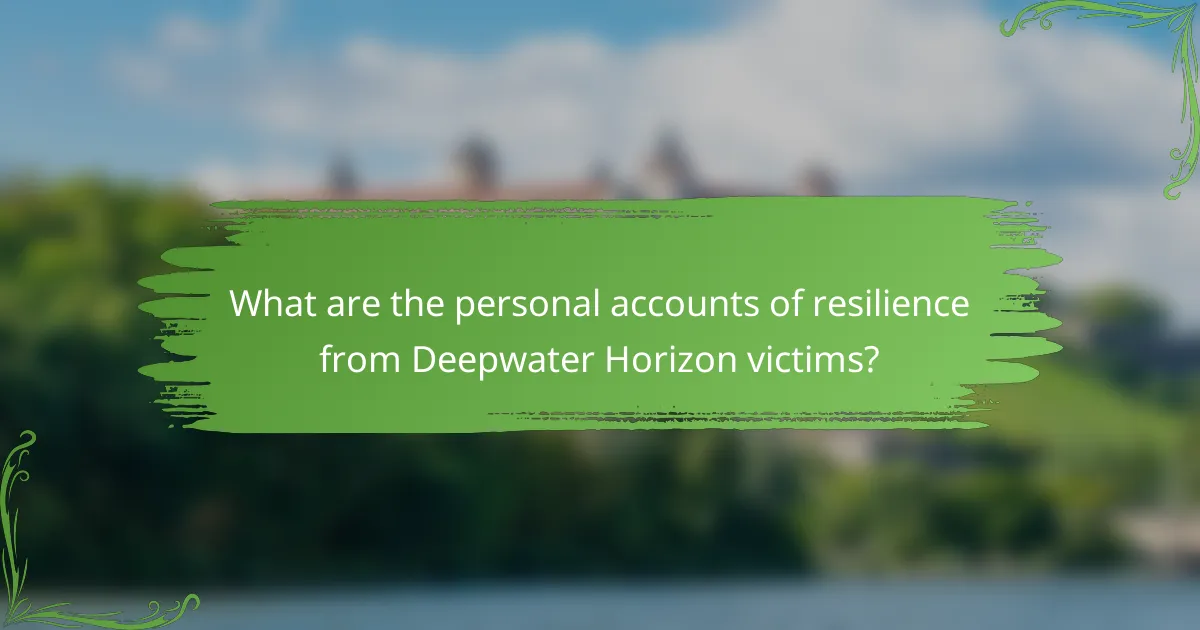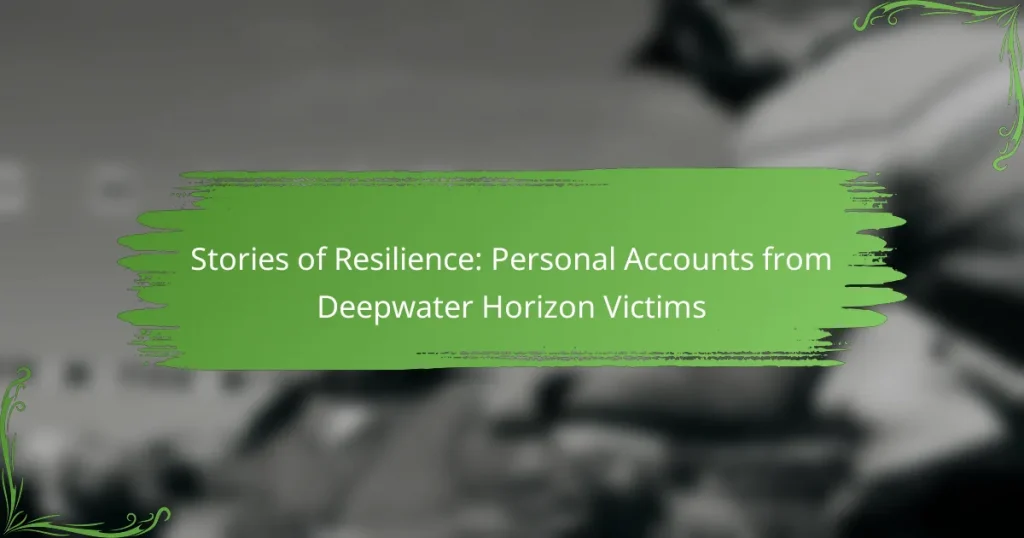The article presents personal accounts from victims of the Deepwater Horizon disaster, highlighting their resilience and determination in the face of significant challenges such as loss of livelihood and environmental devastation. Survivors share their experiences of rebuilding their lives, emphasizing the vital role of community support in overcoming adversity. Many individuals transitioned into advocacy for safer oil industry practices, while others focused on mental health recovery through therapy and support groups. Additionally, victims express a commitment to preserving the Gulf’s ecosystem, collectively illustrating the capacity of the human spirit to endure and adapt after tragedy.

What are the personal accounts of resilience from Deepwater Horizon victims?
Personal accounts of resilience from Deepwater Horizon victims illustrate their strength and determination. Many victims faced significant challenges, including loss of livelihood and environmental devastation. Survivors often recount their struggles to rebuild their lives after the disaster. They emphasize the importance of community support in overcoming adversity. Some individuals became advocates for safer practices in the oil industry. Others focused on mental health recovery, sharing their journeys through therapy and support groups. Many victims highlight their commitment to preserving the Gulf’s ecosystem. These stories collectively showcase the human spirit’s capacity to endure and adapt in the face of tragedy.
How did the Deepwater Horizon disaster impact individuals personally?
The Deepwater Horizon disaster significantly impacted individuals personally by causing emotional trauma and financial hardship. Many workers lost their jobs due to the shutdown of oil drilling operations. Families faced uncertainty and stress as they dealt with loss of income. The disaster also led to health issues from exposure to toxic substances. Local communities experienced a decline in tourism, further straining their economies. Psychological effects included anxiety and depression among affected individuals. Studies indicated increased reports of mental health issues in the aftermath. Overall, the disaster had profound personal repercussions for those directly and indirectly involved.
What specific experiences did victims face during the disaster?
Victims of the Deepwater Horizon disaster faced severe emotional and physical trauma. Many experienced immediate fear and panic as the explosion occurred. The loss of loved ones and colleagues added to their distress. Victims also dealt with the aftermath of oil contamination affecting their health. Economic hardships emerged as livelihoods tied to fishing and tourism were devastated. Long-term psychological effects included anxiety and depression. Community ties were strained due to the disaster’s impact. Victims often reported feeling abandoned during the recovery efforts. These experiences highlight the multifaceted challenges faced by those affected by the disaster.
How did victims cope with the immediate aftermath of the incident?
Victims coped with the immediate aftermath of the Deepwater Horizon incident through various strategies. Many sought emotional support from family and friends. This connection helped them process their trauma. Others engaged in community support groups to share experiences. These groups provided a sense of solidarity and understanding. Some victims focused on practical needs, like securing financial assistance. This step was crucial for their recovery. Additionally, many utilized counseling services to address psychological impacts. Research indicates that social support significantly aids in trauma recovery.
What psychological effects did the Deepwater Horizon disaster have on victims?
The Deepwater Horizon disaster had significant psychological effects on victims. Many experienced symptoms of post-traumatic stress disorder (PTSD). Research indicated that approximately 25% of affected individuals reported these symptoms. Anxiety and depression were also prevalent among the victims. Studies showed that around 20% of respondents faced major depressive episodes. Survivors often dealt with feelings of helplessness and grief. These emotions were linked to the loss of livelihoods and community disruption. Long-term mental health issues emerged in many cases, persisting years after the incident. The psychological impact was exacerbated by ongoing environmental concerns and economic instability.
How did survivors manage their mental health post-disaster?
Survivors managed their mental health post-disaster through various coping strategies. They engaged in community support networks to share experiences and feelings. Many sought professional counseling to address trauma and anxiety. Some practiced mindfulness and meditation to reduce stress. Others participated in physical activities to improve their mood and overall well-being. Evidence shows that social connections significantly aid in recovery. According to a study by the American Psychological Association, social support is crucial for mental health after traumatic events. These strategies helped survivors rebuild their lives and foster resilience following the Deepwater Horizon disaster.
What support systems were available for victims during recovery?
Support systems available for victims during recovery included counseling services and community support groups. These resources provided emotional and psychological assistance. Victims accessed mental health professionals trained in trauma recovery. Peer support networks allowed victims to share experiences and coping strategies. Financial assistance programs helped alleviate economic burdens. Legal aid services supported victims in navigating claims and compensation. Educational resources informed victims about available services and recovery processes. These systems collectively aimed to facilitate healing and resilience among victims.
What stories of resilience stand out among Deepwater Horizon victims?
It is difficult to pinpoint specific stories of resilience among Deepwater Horizon victims due to the vast number of individuals affected. However, many survivors have shared their experiences of overcoming trauma and loss. For instance, some workers returned to the industry despite the psychological impact of the disaster. Others have become advocates for safety regulations, using their experiences to push for change. Community members have also rallied together, supporting each other through recovery efforts. These accounts highlight the strength and determination of those impacted by the tragedy.
Who are some notable individuals whose stories exemplify resilience?
Notable individuals whose stories exemplify resilience include Mike Williams, a survivor of the Deepwater Horizon disaster. He demonstrated remarkable fortitude by escaping the rig during the catastrophic explosion in 2010. Williams later shared his experience, highlighting the mental and physical challenges he faced. Another example is Andrea Fleytas, who was also on the rig. She showed incredible strength by helping others evacuate amidst chaos. Both individuals have become advocates for safety and environmental awareness since the incident. Their stories reflect the human spirit’s ability to overcome adversity.
What lessons can be learned from these personal accounts?
Personal accounts from Deepwater Horizon victims reveal crucial lessons about resilience and recovery. These narratives highlight the importance of community support during crises. Individuals emphasized the need for mental health resources in the aftermath of disasters. Many shared the value of sharing experiences to foster healing. The accounts also illustrated the significance of adaptive coping strategies in overcoming adversity. Victims demonstrated that perseverance can lead to personal growth and renewed purpose. Their stories encourage proactive measures for disaster preparedness and response. Overall, these lessons underline the human capacity to endure and rebuild after traumatic events.
How do these personal accounts relate to broader themes of resilience?
Personal accounts from Deepwater Horizon victims illustrate broader themes of resilience through shared experiences of adversity. These narratives highlight individual struggles against loss and trauma. Victims demonstrate the capacity to adapt and rebuild their lives after the disaster. Many accounts emphasize community support as a critical factor in fostering resilience. The stories reveal how personal determination drives recovery efforts. Research indicates that storytelling can enhance emotional healing and collective resilience. Studies show that sharing experiences helps individuals process trauma effectively. Overall, these accounts serve as powerful examples of resilience in the face of environmental and emotional challenges.
What common challenges did victims face in rebuilding their lives?
Victims of the Deepwater Horizon disaster faced numerous challenges in rebuilding their lives. Financial instability was a primary issue, as many lost their jobs and sources of income. Emotional trauma also significantly impacted their mental health, leading to anxiety and depression. Accessing healthcare services became difficult for some, complicating their recovery. Additionally, navigating the legal and bureaucratic processes for compensation proved to be overwhelming. Many victims experienced social isolation, as their communities were affected by the disaster. Rebuilding trust in the local environment and economy was another hurdle. These challenges collectively hindered their ability to regain a sense of normalcy and stability in their lives.
What strategies did Deepwater Horizon victims use to overcome adversity?
Deepwater Horizon victims used community support, personal resilience, and legal action to overcome adversity. Many victims formed support groups to share experiences and resources. They relied on family and friends for emotional support during difficult times. Victims also engaged in advocacy efforts to raise awareness about their struggles. Some pursued legal claims against BP for compensation. Others sought mental health services to cope with trauma. These strategies helped them rebuild their lives after the disaster. Community initiatives provided job training and financial assistance, facilitating recovery. Overall, a combination of personal and collective efforts played a crucial role in their resilience.
How did community support play a role in their recovery?
Community support significantly aided the recovery of Deepwater Horizon victims. Local networks provided emotional and practical assistance during their difficult times. Victims reported feeling less isolated due to community outreach programs. Support groups facilitated sharing experiences and coping strategies. Financial aid from local businesses helped alleviate immediate economic burdens. Volunteers organized events to raise awareness and funds for affected families. Research indicates that social support enhances psychological resilience in crisis situations. The collective effort of the community fostered a sense of belonging and hope among the victims.
What personal attributes contributed to their resilience?
Personal attributes that contributed to resilience include adaptability, perseverance, and strong social support. Adaptability allows individuals to adjust to changing circumstances effectively. Perseverance helps them to keep striving despite challenges. Strong social support provides emotional and practical assistance during difficult times. Research shows that these attributes significantly enhance coping mechanisms in crisis situations. For instance, a study by Tugade and Fredrickson (2004) in the Journal of Personality and Social Psychology indicates that individuals with positive emotional resilience can better navigate adversity.
What resources are available for those affected by similar disasters?
Resources available for those affected by similar disasters include government assistance programs, non-profit organizations, and community support networks. The Federal Emergency Management Agency (FEMA) provides financial aid for disaster recovery. Non-profit organizations like the Red Cross offer immediate relief and long-term recovery support. Local community groups often organize resources and support for affected individuals. Mental health services are also available through various organizations to assist with emotional recovery. These resources have been instrumental in helping victims rebuild their lives after disasters.
How can individuals find support in their own recovery journeys?
Individuals can find support in their recovery journeys through various means. They can seek out therapy or counseling services that specialize in trauma recovery. Support groups offer a communal space for sharing experiences and coping strategies. Online forums and communities provide additional resources and connections. Engaging with mental health professionals can offer tailored guidance and coping techniques. Family and friends can also play a crucial role in providing emotional support. Research shows that social support significantly enhances recovery outcomes. A study by the American Psychological Association found that individuals with strong support networks report better mental health.
What organizations offer assistance to disaster victims?
Organizations that offer assistance to disaster victims include the American Red Cross, FEMA, and local community organizations. The American Red Cross provides emergency shelter, food, and medical care. FEMA offers financial assistance and resources for recovery after disasters. Local organizations often provide immediate support tailored to community needs. These organizations have a history of responding to various disasters, including hurricanes and oil spills. Their efforts are crucial in helping victims rebuild their lives after such events.
The main entity of the article is the personal accounts of resilience from Deepwater Horizon victims. The article explores the significant emotional and financial challenges faced by individuals affected by the disaster, including trauma, loss of livelihood, and health issues. It highlights various coping strategies employed by victims, such as community support, advocacy, and mental health recovery efforts. Additionally, the article discusses the role of support systems in facilitating recovery and the broader themes of resilience illustrated through these personal narratives. Notable individual stories exemplifying resilience are also presented, underscoring the human capacity to adapt and rebuild in the aftermath of tragedy.


